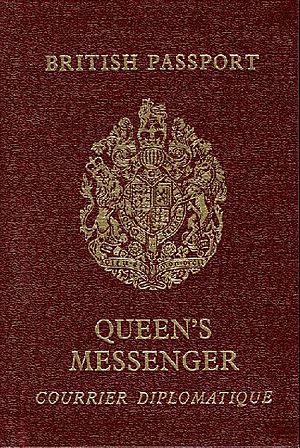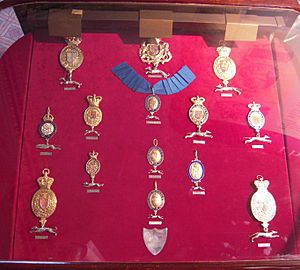King's Messenger facts for kids
The King's Messengers (or Queen's Messengers when a queen rules) are special couriers who work for the British government. Their main job is to hand-carry secret and very important documents. They deliver these documents to British embassies, high commissions, and consulates all over the world. Many of these messengers used to work in the British Army. They usually travel in regular clothes, flying business class on normal airlines, carrying their important packages. The name of their group changes depending on whether a King or Queen is on the throne.
The special bags they carry are called "diplomatic bags." These bags are protected by international rules, like the Vienna Convention on Diplomatic Relations. This means that for reasons of national secrecy, these bags usually do not go through regular airport security checks. They should not be opened, X-rayed, or checked by customs officials in other countries. The only time they might be checked is if there is strong proof they contain illegal items. A King’s Messenger is like a diplomat and cannot be held by foreign governments. However, these special rules do not apply when the messengers are in the UK. In the UK, their diplomatic bags can be checked by customs, and the messenger's personal luggage must go through normal security.
Contents
The History of Royal Messengers
Early Beginnings
The job of a 'Royal Messenger' has been around for a very long time, at least since the early 1100s in England. Back then, they were called 'Nuncii' if they rode horses or 'Cursores' if they walked. They were paid well because their job was so important. We can find records of these messengers from the time of King John, King Henry III, and the first three King Edwards.
Carrying Messages for the King
These early messengers carried important messages all around England and even to other countries for the government. They were the main way the King communicated with local officials like sheriffs and mayors. They traveled on regular routes, making sure the King always knew what was happening and if his orders were being followed. Sometimes, they also transported money or valuable items across the country. There were usually between 30 and 60 messengers working at any one time.
The Silver Greyhound Symbol
A famous King's Messenger from the 1400s was John Norman. King Richard III appointed him in 1485 to deliver secret papers. Later, when Charles II was in exile, he chose four trusted men to carry messages to his supporters in England. To show their authority, the King broke four silver greyhound figures from a special bowl. He gave one to each man. This is how the silver greyhound became the official symbol of the King's Messenger Service. Today, messengers wear this badge on formal occasions. For less formal work, male messengers wear ties with a small greyhound pattern. In 1824, the messengers officially became part of the UK Foreign Office.
King's Messengers Today
Their Role in Modern Times
With all the modern ways to communicate, like email and secure networks, the job of King's Messengers has changed. However, original secret documents still need to be moved safely between countries. Because of this, their role is still important, even if it's not as big as it once was.
Number of Messengers
In 1995, there were 27 King's Messengers. By March 2015, this number had gone down to sixteen full-time and two part-time messengers. In December 2015, some news reports suggested the service might be stopped to save money. However, the service is still active today. It is part of the secure logistics team within FCDO Services, which is part of the Foreign Office.
Other Mentions
You might also see the name 'Queen's Messenger' on a train! The British Rail Class 67 diesel locomotive 67005 is named Queen's Messenger. In November 2022, King Charles III officially confirmed the role of King's Messengers.
See also
- Diplomatic courier
- BSAA Star Dust was carrying a King's Messenger when it disappeared.
- SS Berlin was carrying a King's Messenger when it sank.
- The Queen's Messenger (TV drama)
 | Jessica Watkins |
 | Robert Henry Lawrence Jr. |
 | Mae Jemison |
 | Sian Proctor |
 | Guion Bluford |



